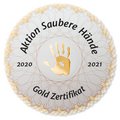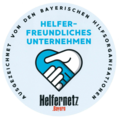Blood donation
Donation procedure
A donation that takes place in the morning at Regensburg University Hospital can save the life of a patient the same evening.
Donating blood at Regensburg University Hospital differs from other institutions. Certain components of the blood are separated from the whole blood whilst the blood is being taken; the remaining components of the blood are returned to the blood donor straightaway
From the registration to the end of the procedure, a blood donation at Regensburg University Hospital can take up to two hours. Please allow plenty of time!
The completion of a questionnaire, the blood test and a medical consultation in the context of the donation guarantee that there is no health risk either for the donor or for the recipient. Following the donation, you can have a little snack and rest. Only after this can you once again actively drive on public roads. You will receive appropriate compensation.
Donors are honoured for every 25th donation
The Institute for Clinical Chemistry and Laboratory Medicine regularly thanks blood donors for their commitment. In the case of jubilee donations, the donors receive a certificate and a shopping voucher. In the first six months of 2016, 32 blood donors were honoured, including a 175th donation, a 125th donation and four 100th blood donations.
-
1. Registration at the central office with a personal ID card or passport
You will find us in the University Hospital, Section C3/C4, on the 1st basement level.
Regensburg University Hospital map: finding your way around
2. Testing
After your veins have been checked, blood will be taken to see whether enough thrombocytes (blood platelets) are available for a donation. The results are available after around 20 minutes.3. Questionnaire and declaration of consent
Whilst the quantity of thrombocytes in your blood is being analysed, you will be given a questionnaire. The conscious completion the questionnaire before every blood donation helps to determine your current state of health, assess your suitable for donation and thus protect blood donors and recipients.4. Medical consultation
If you have enough thrombocytes, a detailed medical consultation will take place. The donation procedure and how you should behave before, during and after the blood donation will be explained to you and there will be a physical examination.5. Discharge
After the consultation, you will be discharged to go home and can already arrange an appointment for your 1st donation. You will generally receive a written confirmation of your suitability to donate blood after five days – if the results of the further blood test are available. Then you can arrange an appointment for your first donation by telephone.
-
What you should bear in mind before every donation!
1. Registration at our central office with a personal ID card or passport
Before every donation, you must complete a questionnaire about your medical history.2. Testing
Blood will be taken to check the haemoglobin, haematocrit, leukocyte and thrombocyte levels and thus to assess your suitability as a donor. Complete the donor questionnaire whilst you are waiting for the results (approx. 20 minutes).3. Medical consultation
If your blood levels allow a donation, you will undergo a medical examination to assess your suitability and a medical consultation. Your blood pressure, pulse and temperature will be checked. You can, of course, also ask questions here at any time.4. Donation
Make yourself comfortable in the donor chair and relax. You will be punctured in one or both arms, then the machine will start. The donation is complete after around 90 minutes. Only sterile single-use material will be used. A risk of infection is eliminated.5. Rest
After donating blood, you must rest for another half hour in our waiting area. Drinks and sandwiches are available for you. Then we will check your blood pressure and well-being again. You should not drive in the first half hour after the donation; professional drivers should not drive on the same day. The same applies to dangerous activities.If you have any questions, doctors, nurses and the staff of the central office are available at any time.








